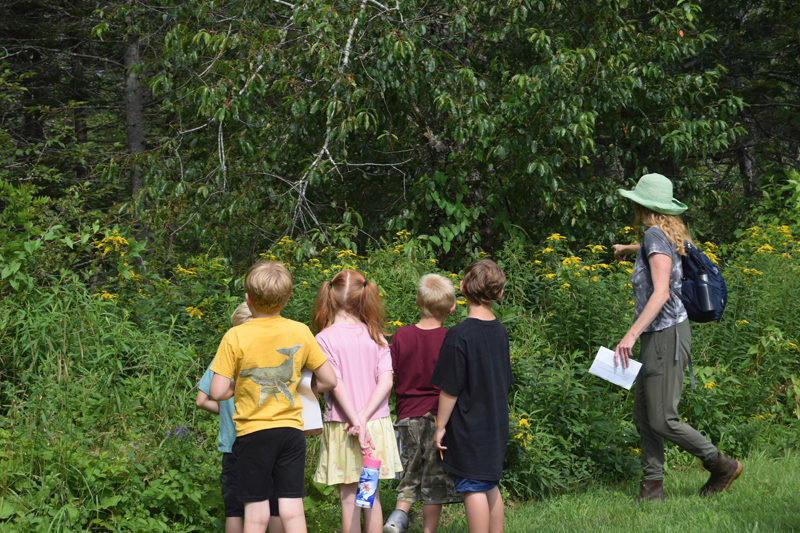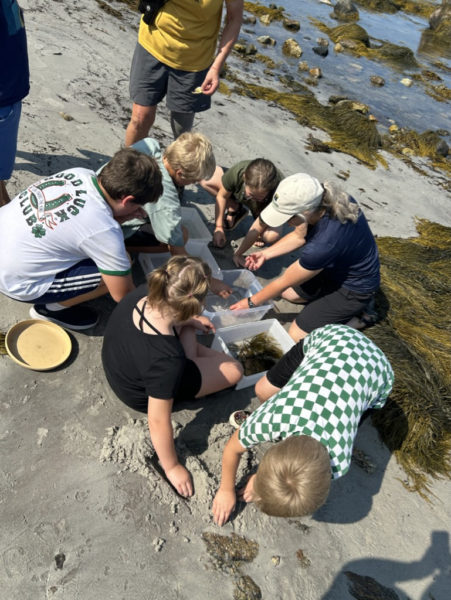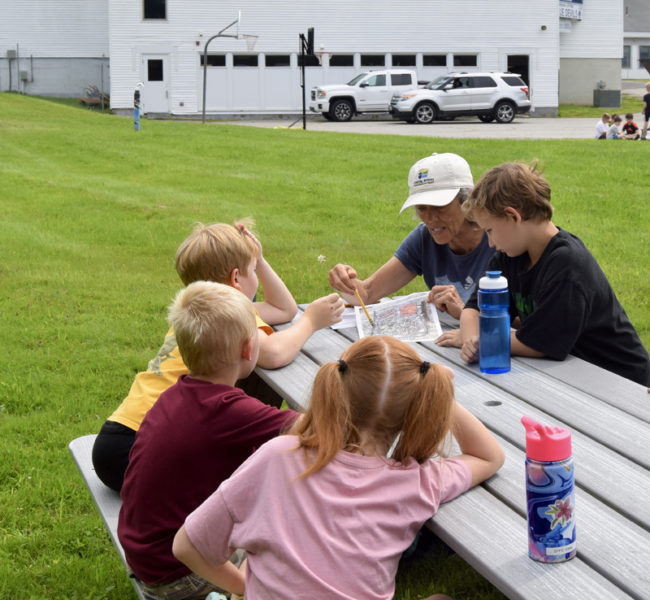
AOS 93 students explore nature on Bristol Consolidated School trails, guided by instructor Heather Hardy, during a field trip on Aug. 7. Other activities on the field trip included making art with objects found in nature, a scavenger hunt, and education about local plants and insects. (Dylan Burmeister photo)
Prior to school kicking off for the year, AOS 93 and Coastal Rivers Conservation Trust partnered to create a new, hands-on opportunity for local students enrolled in summer school. For four Fridays, students took all-day field trips to local parks and trails, where they experienced “a full day of outdoor education and nature programming,” said Sarah Gladu, Coastal Rivers’ director of education and citizen science.
During the series, students visited the Library Park Preserve and Plummer Point in South Bristol, Pemaquid Beach, and the Bristol Recreation Trail, located at Bristol Consolidated School. Buses picked up students and brought them to the park or preserve where they would be spending the day.
“We wanted kids to spend time learning outdoors and discovering some of the amazing places in their own communities,” AOS 93 Assistant Superintendent Tara McKechnie said.
Five Coastal Rivers educators led the excursions and summer school staff from AOS 93 was present for support, according to Gladu. AOS 93 consists of Bremen, Bristol, Damariscotta, Jefferson, Nobleboro, Newcastle, and South Bristol.
“They had a lot of different types of activities that they were involved with,” Gladu said. “The instructors kept them very busy exploring on the shore, exploring in the woods, and experiencing a lot of different habitats within a very small region.”
Gladu said that there had been around 50 students registered in grades 1-8, but that the program had an average attendance of 35.
“It was a very multidisciplinary type of program,” she said. “Providing both context- (and) place-based learning, and hands-on learning all at the

Students explore the seashore and ecosystem at Pemaquid Beach on a field trip with Coastal Rivers Conservation Trust. (Photo courtesy Tara McKechnie)
same time makes learning a lot more accessible to young people.”
While Coastal Rivers is involved with outdoor education programs year-round, this is the first time it has been connected to a summer school program, Gladu said.
“The instructors get to know the kids a bit, and they get to see them for several Fridays in a row,” she said. “That provides the kids with a certain level of comfort and confidence.”
The educators worked to incorporate math and reading into the program, and taught students about different plants, animals, and insects that could be found in the ecosystems they visited.
“Because this is a selected group of students who need enrichment anyway, it’s a way to provide academic and community-based enrichment,” Gladu said. “These are the kids who need to learn what applied science and applied math is. Many of them struggle in some classes, so we did a lot of integrating basic math skills and graphing and literature introductions.”
Gladu added that there is value in hands-on learning, which allows students to experience education with “all five senses, which is much different than being in a classroom.”
“It’s actually immersive science,” she said. “Instead of just learning about aquatic insects, they go out and they are in the environment where aquatic insects are.”
On one excursion at the Bristol Consolidated School, educator Lorna Fake asked students to describe what they thought of when they heard the word ‘nature.’ Students said their minds went to animals, flowers, and protecting the world around them.
“If you look for nature, you can find it anywhere,” Fake said.
McKechnie reached out to Gladu after writing a grant to the World Health Organization looking to provide “special enrichment opportunities,” Gladu said.
“We’ve worked together on curriculum-related projects,” Gladu said. “So, Tara reached out to me and said, ‘Would Coastal Rivers be willing to

Instructor Lorna Fake incorporates mathematics into an art project at Bristol Consolidated School on Aug. 7. Summer school students had the opportunity to visit local nature preserves through a partnership between AOS 93 and Coastal Rivers Conservation Trust and receive hands-on education from Coastal Rivers educators. (Dylan Burmeister photo)
provide field trips for students?’”
McKechnie said that funds for two of the Coastal Rivers trips, transportation, and supplies were provided by a Title 1 Summer Reallocation Grant for all five AOS 93 schools, which administrators began writing in late February and had approved by late April.
The other trips were funded by money distributed by the Maine Department of Education from the federal Elementary and Secondary School Emergency Relief Fund.
McKechnie said that AOS 93 and Coastal Rivers will look for ways to continue the discovery program next year.
“The feedback from students and families has been really positive,” she said.
Gladu also said she believed the program was a success that could continue in future years.
“One day, I witnessed a child who was saying ‘I don’t like hiking, I don’t like bugs, I don’t want to go,’ and by the end of the day he was literally skipping down the trail and cheering on his friends who had to lug some heavy stuff back to the bus,” she said. “I think the kids had a great time and really enjoyed it.”






